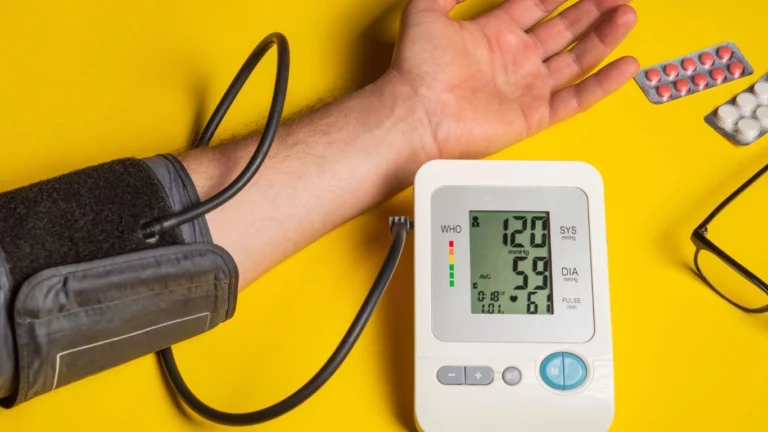Managing Hypertension on a Vegetarian Diet
Struggling to manage your hypertension while sticking to a vegetarian diet? No worries, we’ve got you covered with tips, tricks, and food options that’ll help you lower your blood pressure without compromising on taste or health!
If you’ve been diagnosed with hypertension, you probably already know the importance of managing your blood pressure. But did you know that a vegetarian diet can actually play a huge role in controlling it? That’s right – with the right food choices, you can help lower your blood pressure, improve your heart health, and feel better overall, all while sticking to a plant-based lifestyle.
In this article, we’ll break down everything you need to know about managing hypertension on a vegetarian diet, from what foods to embrace to what lifestyle changes you can make to support your heart health. Ready to get started? Let’s dive in!

Why a Vegetarian Diet Can Help with Hypertension
A vegetarian diet can be super effective in lowering blood pressure because it’s rich in heart-healthy nutrients like fiber, potassium, and magnesium. These nutrients help keep your arteries healthy and support your overall cardiovascular system. Plus, plant-based diets tend to be lower in unhealthy fats and sodium, which are big contributors to high blood pressure.
But not all vegetarian foods are created equal. If you want to manage hypertension effectively, it’s all about picking the right foods and avoiding the wrong ones. Here’s how you can make sure your vegetarian diet is working for you.

The Best Vegetarian Foods for Lowering Blood Pressure
So, what foods should you load up on if you’re aiming to manage your blood pressure? Let’s take a look at some top picks:
1. Leafy Greens
Leafy greens like spinach, kale, and Swiss chard are packed with potassium. Potassium helps your kidneys balance the amount of sodium in your body, which is crucial for controlling blood pressure. Try adding these greens to your salads, smoothies, or sautéing them as a side dish!
2. Berries
Blueberries, strawberries, and raspberries are not only delicious but also rich in antioxidants, especially anthocyanins. Studies have shown that these compounds can help reduce blood pressure. Snack on berries, add them to your oatmeal, or toss them into your yogurt for a sweet, healthy treat.
3. Beets
Beets are another veggie that’s great for lowering blood pressure. They contain nitrates, which help relax and dilate blood vessels, improving blood flow and reducing pressure. You can enjoy them roasted, in salads, or even as beet juice.
4. Oats
Oats are high in soluble fiber, which can help lower cholesterol and support heart health. They’re also good for managing blood pressure. Try starting your day with a warm bowl of oatmeal or incorporating oats into baked goods like muffins or pancakes.
5. Legumes
Beans, lentils, and chickpeas are all fantastic plant-based sources of protein and fiber. They’re also known to help lower blood pressure by improving heart health and regulating blood sugar levels. Add legumes to soups, salads, and stews or blend them into hummus for a quick snack.
6. Nuts and Seeds
Nuts like almonds, walnuts, and pistachios, as well as seeds like flaxseeds and chia seeds, contain healthy fats and magnesium, which are important for blood pressure regulation. A handful of mixed nuts makes a great snack, or sprinkle seeds over your salads or smoothies.

Foods to Avoid When Managing Hypertension
Just as important as knowing what to eat is knowing what to avoid. If you’re looking to manage your blood pressure on a vegetarian diet, these are some foods you should steer clear of:
1. High-Sodium Foods
Foods like canned soups, processed snacks, and fast food are often loaded with sodium, which can increase blood pressure. Be sure to check labels for sodium content and try to cook from scratch as much as possible.
2. Refined Carbs
While bread and pasta might be staples in many vegetarian diets, refined carbs (like white bread, pastries, and white rice) can spike blood sugar levels and contribute to high blood pressure. Opt for whole grains like brown rice, quinoa, and whole-wheat pasta instead.
3. Excessive Alcohol
Drinking too much alcohol can raise your blood pressure and put a strain on your heart. If you enjoy a glass of wine or beer now and then, that’s fine, but moderation is key.
4. Sweets and Sugary Drinks
Sweetened drinks and processed sweets can lead to weight gain and increase the risk of high blood pressure. Instead of sugary drinks, hydrate with water, herbal teas, or fresh fruit-infused water.

Lifestyle Tips for Managing Hypertension on a Vegetarian Diet
Diet is just one part of the puzzle when it comes to managing hypertension. Here are some additional lifestyle changes you can make to help lower your blood pressure:
1. Exercise Regularly
Exercise helps your heart pump blood more efficiently, which can lower blood pressure over time. Aim for at least 150 minutes of moderate-intensity exercise each week, like brisk walking, swimming, or cycling.
2. Manage Stress
Stress can raise your blood pressure, so it’s important to find ways to relax. Meditation, deep breathing exercises, or even just taking a walk outside can help calm your mind and keep your blood pressure in check.
3. Get Enough Sleep
Sleep is essential for heart health. Aim for 7-9 hours of quality sleep each night. Poor sleep can raise blood pressure, so try to establish a regular sleep schedule and avoid caffeine close to bedtime.

Conclusion
Managing hypertension on a vegetarian diet is absolutely doable, and it can actually be quite beneficial for your health. By focusing on nutrient-dense foods like leafy greens, berries, and legumes, while avoiding high-sodium and processed foods, you can take control of your blood pressure and improve your overall heart health.
Remember, the key is consistency—stick to a healthy, balanced vegetarian diet, make a few lifestyle tweaks, and you’ll be well on your way to better blood pressure management.
Appendices
FAQs
- Can I manage hypertension with just a vegetarian diet?Yes, a vegetarian diet can help lower blood pressure when combined with other healthy habits like regular exercise, stress management, and sufficient sleep.
- Are there any vegetarian foods that can make hypertension worse?Yes, foods that are high in sodium (like processed snacks, canned foods, and take-out meals) and refined sugars can contribute to high blood pressure.
- Is a plant-based diet better for heart health than a meat-based diet?A plant-based diet, when done right, tends to be lower in unhealthy fats and sodium, which are known to raise blood pressure. Many studies suggest it’s beneficial for heart health.
- How long does it take to see results from a vegetarian diet on hypertension?You may start noticing improvements in your blood pressure within a few weeks to a couple of months, depending on how closely you follow the dietary and lifestyle changes.
- Can I eat out while managing hypertension on a vegetarian diet?Yes! You can find heart-healthy vegetarian options at most restaurants. Just make sure to ask for your dish to be prepared with less salt and avoid fried foods or high-sodium sauces.
References
- American Heart Association (2024). “How Diet Can Help Manage High Blood Pressure.”
- National Institutes of Health (2024). “Hypertension and Diet: The Benefits of a Plant-Based Diet.”
- The Vegetarian Resource Group (2023). “Managing Hypertension on a Vegetarian Diet.”
Disclaimer
The information provided in this article is for educational purposes only and does not replace professional medical advice. Always consult with your healthcare provider or dietitian before making changes to your diet or lifestyle, especially if you have a medical condition like hypertension.

Dr. Gwenna Aazee is a board-certified Internal Medicine Physician with a special focus on hypertension management, chronic disease prevention, and patient education. With years of experience in both clinical practice and medical writing, she’s passionate about turning evidence-based medicine into accessible, actionable advice. Through her work at Healthusias.com, Dr. Aazee empowers readers to take charge of their health with confidence and clarity. Off the clock, she enjoys deep dives into nutrition research, long walks with her rescue pup, and simplifying medical jargon one article at a time.







